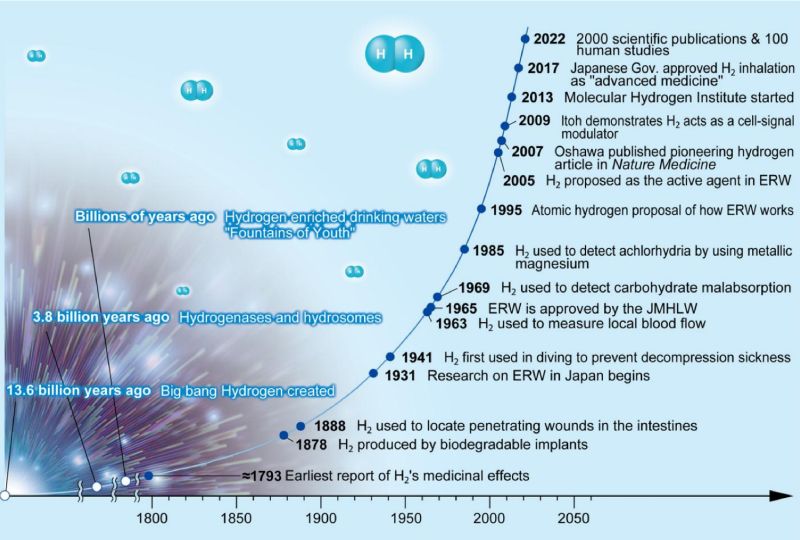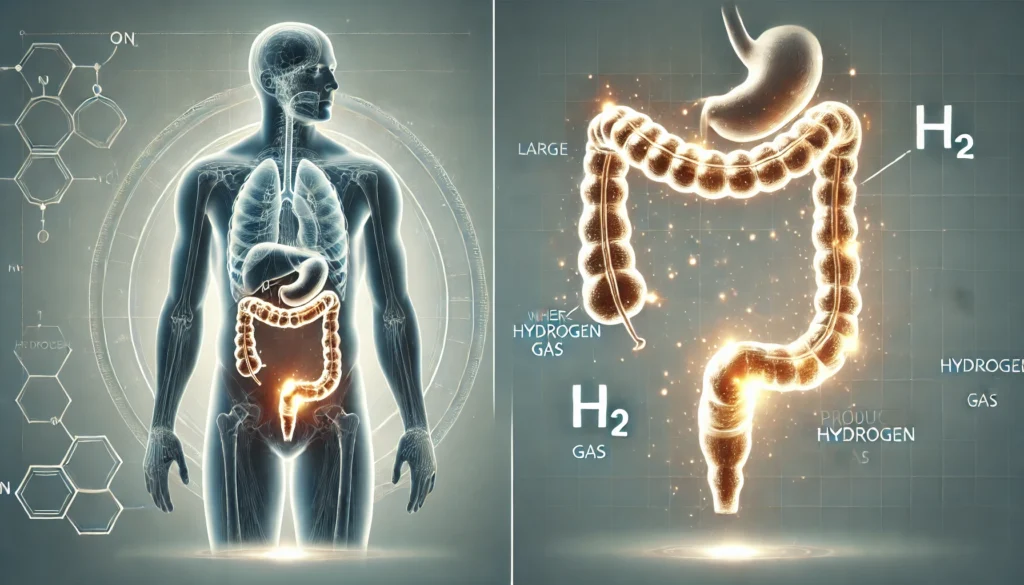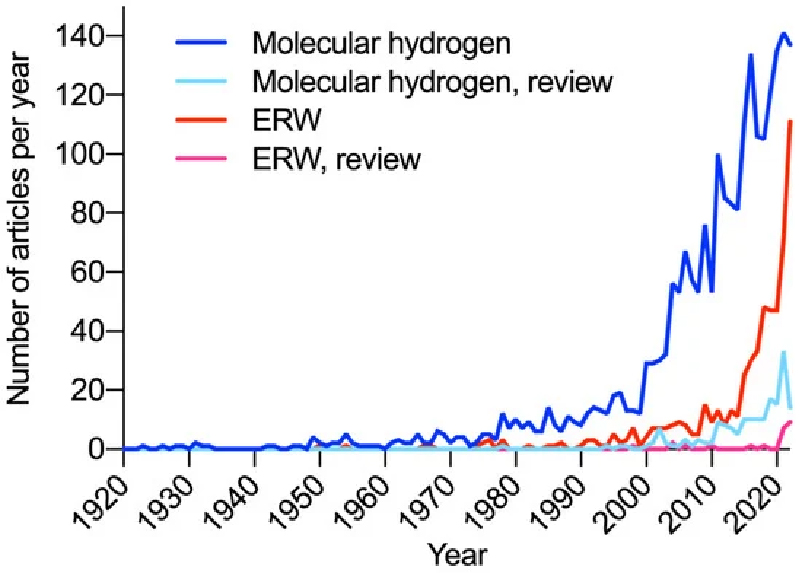Product Background
Story of Hydrogen Therapy

As of June 2024, research on hydrogen therapy has resulted in over 2,000 published studies and more than 100 clinical trials.
For the past 17 years, the medical efficacy of hydrogen (H₂) has been widely debated. However, recent advancements in research have strengthened our understanding of its benefits.
Although hydrogen is naturally produced in the human gut and we have been utilizing hydrogen-rich water for centuries, its potential health benefits remained largely unrecognized until recently. In 2007, Dr. Shigeo Ohta of Japan published a landmark study demonstrating hydrogen’s therapeutic potential, igniting global interest in hydrogen and leading to an expansion of research on the medical application of hydrogen.
This paper is widely regarded as the beginning of modern hydrogen therapy research, marking a pivotal moment in the scientific exploration of hydrogen in human health.

Mechanism
Hydrogen gas (H2)is naturally produced in the colon of all animals, including humans.
This occurs during the fermentation process of gut microbes, primarily through the breakdown of indigestible carbohydrates such as dietary fiber by anaerobic bacteria. As a byproduct of this metabolic activity, hydrogen gas is released in the final stage of primary fermentation.
Specific hydrogen-producing bacteria, which contain hydrogenase enzymes, play a key role in this process. These bacteria anaerobically ferment carbohydrates, releasing H₂ gas, which can then be utilized by other gut microbes, such as methanogens, which convert hydrogen into methane (CH₄), and sulfate-reducing bacteria, which produce hydrogen sulfide (H₂S).
The level of hydrogen gas production depends on several factors, including gut microbiome composition (types and abundance of bacteria), colonic pH levels, and presence of metabolic byproducts (e.g., bile acids). Notably, bile acids have been found to inhibit methane production, which can lead to higher levels of hydrogen gas in some individuals.
Effects on the Human Body
Hydrogen gas (H₂) naturally produced in the colon plays several essential roles in human gut health and overall physiology. For instance, hydrogen gas acts as an electron donor in various microbial metabolic pathways, supporting the growth and function of gut microbiota. It also plays a key role in microbial balance, which is crucial for digestive health, immune function, and metabolic regulation.
From a broader physiological perspective, hydrogen gas enters human cells and influences various physiological processes.
Specifically, it impacts the Krebs cycle (citric acid cycle), which is essential for ATP synthesis, thereby boosting energy production and potentially enhancing immune function.
Lastly, hydrogen gas is recognized for its strong antioxidant properties. It neutralizes reactive oxygen species (ROS), reducing oxidative stress and inflammation throughout the body. Because oxidative damage and inflammation contribute to many chronic diseases, hydrogen therapy is being explored as a potential treatment for conditions linked to cellular stress and immune dysfunction.
Summary
Hydrogen gas is naturally produced in the human colon through microbial fermentation. This natural gas plays an essential role in digestive health and overall physiological function. Also, its antioxidant and anti-inflammatory properties suggest potential therapeutic benefits.
Next, let’s take a look at two papers related to the history of hydrogen inhalation therapy.

The On/Off History of Hydrogen in Medicine: Will the Interest Persist This Time Around?
The On/Off History of Hydrogen in Medicine: Will the Interest Persist This Time Around?
Abstract: Over 2000 publications including more than 100 human studies seem to indicate that humans have only recently benefited from or known about the medical effects of H2 within the past 15 years.
However, we have unknowingly benefited from H2 since the dawn of time, from H2-producing bacteria to the use of naturally occurring hydrogen-rich waters. Moreover, the first writings on the therapeutic effects of H2 date to around 1793.
Since then, papers appeared sporadically in the literature every few decades but never exploded until Ohsawa et al. again demonstrated hydrogen’s therapeutic effects in 2007.
This landmark paper appears to have been the spark that ignited the medical interest in hydrogen.
Although H2 was used in the 1880s to locate intestinal perforations, in the 1940s in deep sea diving, and in the 1960s to measure blood flow, H2 was largely viewed as biologically inert.
This review highlights the history of hydrogen in the genesis/evolution of life and its medicinal and non-medicinal use in humans. Although hydrogen medicine has a long and erratic history, perhaps future history will show that, this time around, these 15 years of ignited interest resulted in a self-sustaining explosion of its unique medical effects.
The Evolution of Molecular Hydrogen
A Noteworthy Potential Therapy with Clinical Significance
Department of Physiology, Loma Linda University School of Medicine, Risley Hall, Room 223, Loma Linda, CA 92354, USA
Research on molecular hydrogen has advanced tremendously in recent years. Hydrogen is unique because of its ability to act at the cellular level. It can cross the blood-brain barrier, enter mitochondria, and, under certain conditions, move into the nucleus. Studies have shown that once hydrogen reaches these ideal locations within the cell, it exhibits beneficial properties such as antioxidant effects, anti-apoptosis, anti-inflammatory actions, and cellular protection.
With minimal side effects, hydrogen has the potential to become a new, comprehensive treatment for cardiovascular, cerebrovascular, cancer, metabolic, and respiratory diseases and disorders. This review article aims to explore and comprehensively analyze the studies and experiments suggesting that molecular hydrogen is a much-needed new therapy in medicine.
Photobiomodulation Treatment Device
Hyperbaric Oxygen Chamber
Hydrogen Inhalation Machine
Nano-bubble Hydrogen
Water Generator
Whole Body Wave
Motion Exercise Device
Nitro Biome
BAHI Longevity
Product Background
References
Customer Center
Get In Touch
- Haan-ro, Gwangmyeong-si, Gyeonggi-do, Republic of Korea
- +82)2-898-2116
- info@huelight.kr
Copyright 2025 © Hue Light Co., Ltd. All rights reserved.
Disclaimer: The medical papers and academic information provided on this site are intended for educational purposes only and are not meant to
diagnose, treat, prevent diseases, or substitute for a doctor’s advice.
